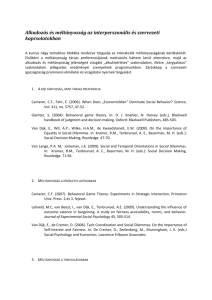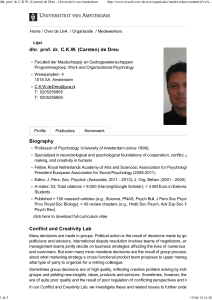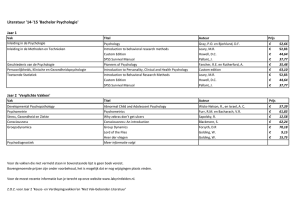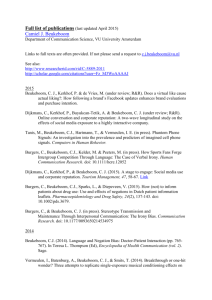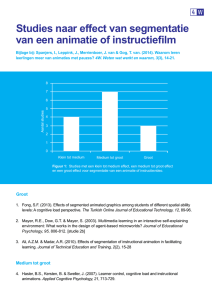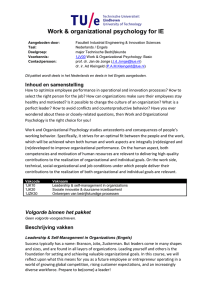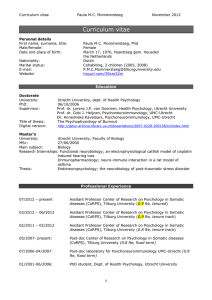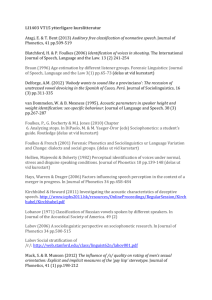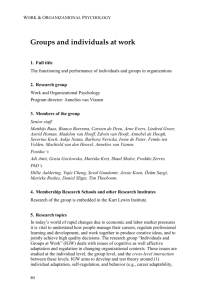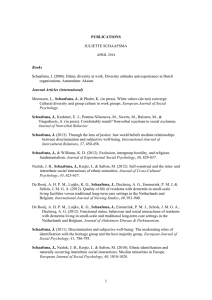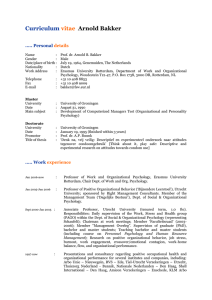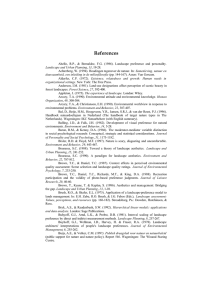Interpersonal Behavior
advertisement
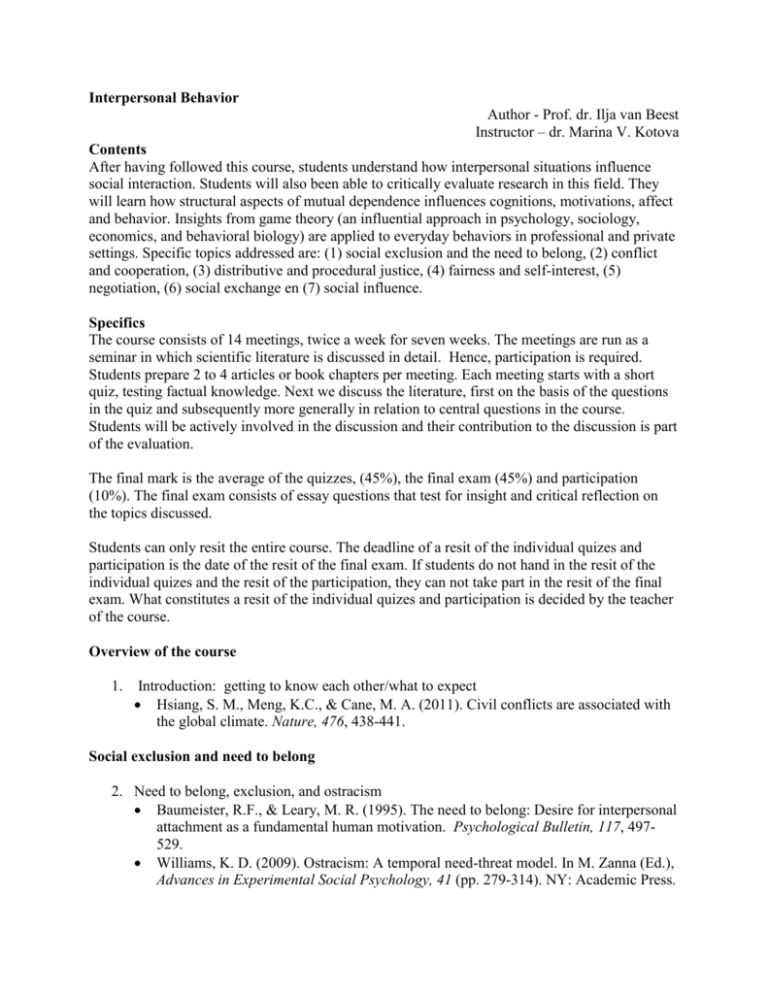
Interpersonal Behavior Author - Prof. dr. Ilja van Beest Instructor – dr. Marina V. Kotova Contents After having followed this course, students understand how interpersonal situations influence social interaction. Students will also been able to critically evaluate research in this field. They will learn how structural aspects of mutual dependence influences cognitions, motivations, affect and behavior. Insights from game theory (an influential approach in psychology, sociology, economics, and behavioral biology) are applied to everyday behaviors in professional and private settings. Specific topics addressed are: (1) social exclusion and the need to belong, (2) conflict and cooperation, (3) distributive and procedural justice, (4) fairness and self-interest, (5) negotiation, (6) social exchange en (7) social influence. Specifics The course consists of 14 meetings, twice a week for seven weeks. The meetings are run as a seminar in which scientific literature is discussed in detail. Hence, participation is required. Students prepare 2 to 4 articles or book chapters per meeting. Each meeting starts with a short quiz, testing factual knowledge. Next we discuss the literature, first on the basis of the questions in the quiz and subsequently more generally in relation to central questions in the course. Students will be actively involved in the discussion and their contribution to the discussion is part of the evaluation. The final mark is the average of the quizzes, (45%), the final exam (45%) and participation (10%). The final exam consists of essay questions that test for insight and critical reflection on the topics discussed. Students can only resit the entire course. The deadline of a resit of the individual quizes and participation is the date of the resit of the final exam. If students do not hand in the resit of the individual quizes and the resit of the participation, they can not take part in the resit of the final exam. What constitutes a resit of the individual quizes and participation is decided by the teacher of the course. Overview of the course 1. Introduction: getting to know each other/what to expect Hsiang, S. M., Meng, K.C., & Cane, M. A. (2011). Civil conflicts are associated with the global climate. Nature, 476, 438-441. Social exclusion and need to belong 2. Need to belong, exclusion, and ostracism Baumeister, R.F., & Leary, M. R. (1995). The need to belong: Desire for interpersonal attachment as a fundamental human motivation. Psychological Bulletin, 117, 497529. Williams, K. D. (2009). Ostracism: A temporal need-threat model. In M. Zanna (Ed.), Advances in Experimental Social Psychology, 41 (pp. 279-314). NY: Academic Press. Van Beest, I., Van Dijk, E., & Williams, K. D. (2011). Cyberbomb: Effects of being ostracized from a death game. Group Processes and Intergroup Relations, 14, 581596. Van Beest, I., & Williams, K. D. (2006). When inclusion costs and ostracism pays, ostracism still hurts. Journal of Personality and Social Psychology, 91,918-928. Conflict and cooperation 3. Interdependence Rusbult, C. E., & Van Lange, P. A. M. (2003). Interdependence, interaction, and relationships. Annual Review of Psychology, 54, 351-375. Van Lange, P. A. M., Otten, W., De Bruin, E. M. N., & Joireman, J. A. (1997). Development of prosocial, individualistic, and competitive orientations: Theory and preliminary evidence. Journal of Personality and Social Psychology, 73, 733-746. 4. Coordination problems Schelling T. C. (1957) Bargaining, communication, and limited war. Journal of Conflict Resolution, 1, 19-36. De Kwaadsteniet, E., Homan, A. C., Van Dijk, E., & Van Beest, I., (2011). The social psychology of tacit coordination: social category information as a cue for coordination succes. Group Processes and Intergroup Relations, 1-15. 5. Dilemmas Weber, J.M., Kopelman, S., & Messick, D.M. (2004). A conceptual review of decision making in social dilemmas. Applying the logic of appropriateness. Personality and Social Psychology Review, 8, 281-307. Dijk, E., DeKwaadsteniet, E., & DeCremer, D. (2009). Tacit coordination in social dilemmas: the importance of having a common understanding. Journal of Personality and Social Psychology, 96, 665-678. Kollock, P. (1998). Social dilemmas: Anatomy of cooperation. Annual Review of Sociology, 24, 183-214. 6. Moral emotions (Marcel Zeelenberg) Zeelenberg, M., Nelissen, R. M. A., Breugelmans, S. M., & Pieters, R. (2008). On emotion specificity in decision making: why feeling is for doing. Judgement and Decision making, 3, 18-27. De Hooge, I.E., Nelissen, R. M. A., Breugelmans, S., & Zeelenberg, M. (2011). What is moral about guilt? Acting prosocially at the disadvantage of others. Journal of Personal and Social Psychology, 100, 462-473. De Hooge, I.E., Breugelmans, S., & Zeelenberg, M. (2008). Not so ugly after all: When shame acts as a commitment device. Journal of Personal and Social Psychology, 95, 933-943. Social exchange 7. Reciprocal altruism Trivers, R. L. (1971). The evolution of reciprocal altruism. The Quarterly Review of Biology. 46, 35–57. 8. Axelrod, R. & Hamilton, W. D. (1981) The evolution of cooperation. Science, 211, 1390–1396. Altruistic punishment Fehr, E. & Gachter, S. (2002) Nature, 415, 137–140. Fehr, E. & Fishbacher, U. (2004). Third-party punishment and social norms. Evolution and Human Behavior, 25, 63-87. Leliveld, M.C., Van Beest, I., & Van Dijk, E. (2012). Punishing and compensating Others at Your Own Expense: The Role of Empathic Concern on Restoring Distributive Justice, European Journal of Social Psychology Distributive and procedural justice 9. Equity theory Adams, J.S. (1965) “Inequality in Social Exchange” in Advances in Experimental Psychology, L. Berkowitz (ed.), Academic Press, New York, NY. pp. 267-299. Walster, E. E. Berscheid and G. W. Walster. (1973). “New Directions in Equity Research.” Journal of Personality and Social Psychology. pp. 151-176 10. Voice effect Van den Bos, K. (2005). What is responsible for the fair process effect? In J. Greenberg & J. A. Colquitt (Eds.), Handbook of organizational justice: Fundamental questions about fairness in the workplace (pp. 273-300). Mahwah, NJ: Erlbaum. Van den Bos, K., Poortvliet, P. M., Maas, M., Miedema, J., & Van den Ham, E.-J. (2005). An enquiry concerning the principles of cultural norms and values: The impact of uncertainty and mortality salience on reactions to violations and bolstering of cultural worldviews. Journal of Experimental Social Psychology, 41, 91-113. Van Prooijen, J. W., Karremans, J. & Van Beest, I. (2006). Procedural justice and the hedonic principle: How approach motivation influences the psychology of voice. Journal of Personality and Social Psychology, 91, 686-697. Negotiation, Self-interest and fairness 11. Deception Koning, L., Van Dijk, E., Van Beest, I., & Steinel, W. (2010). An instrumental account of deception and reaction to deceit in bargaining. Business Ethics Quarterly, 20, 57-73. Koning, L., Steinel, W., Van Beest, I., & Van Dijk, E. (2011). Power and deception in bargaining: An instrumental account of deception. Organizational Behavior and Human Decision Processes, 115, 35-42. Steinel, W., & De Dreu, C. K. W. (2004). Social motives and strategic misrepresentation in social decision making. Journal of Personality and Social Psychology, 86, 419-434. 12. Strength is weakness Van Beest, I., Van Dijk, E. (2007). Self-interest and fairness in coalition formation: A social utility approach to understanding partner selection and payoff allocations in groups. European Review of Social Psychology, 18, 132-174. Van Beest, I, Steinel, W., & J.K. Murnighan (2011) Honesty Pays: On the Benefits of Having and Disclosing Information in Coalition Bargaining. Journal of Experimental Social Psychology, 47, 738-747. Social influence Cialdini R. B. (2001). Influence: Science and Practice. Boston, MA: Allyn & Bacon. 13. Tactics of Cialdini (Reciprocation, commitment, social proof) 14. Tactics of Cialdini (liking, authority, scarcity) Extra literature that may be interesting (not part of exam) Axelrod, R. A. (1984). The evolution of cooperation. New York: Basic Books. Ridley, M. (1997). Origins of virtue. London: Penguin Classics
